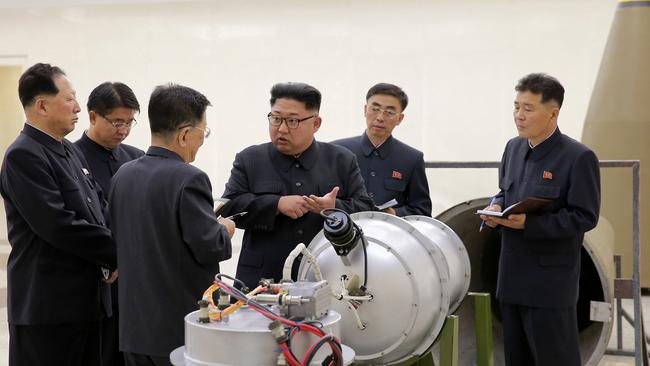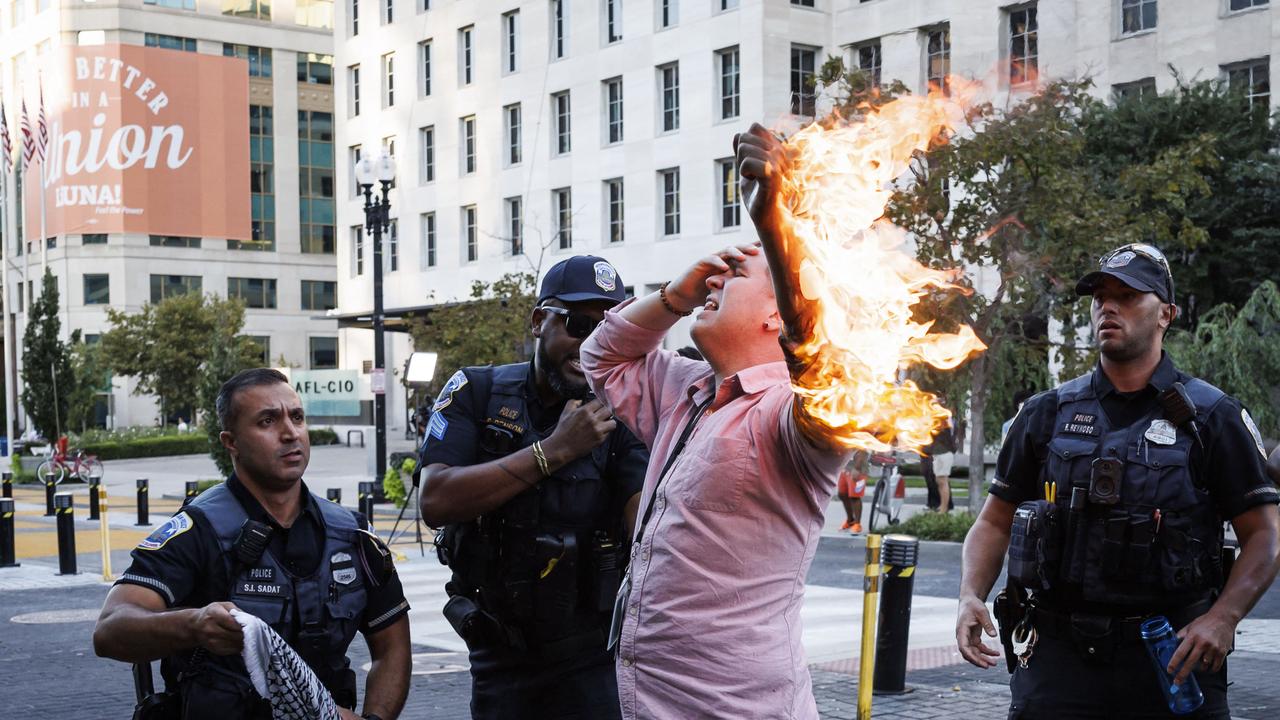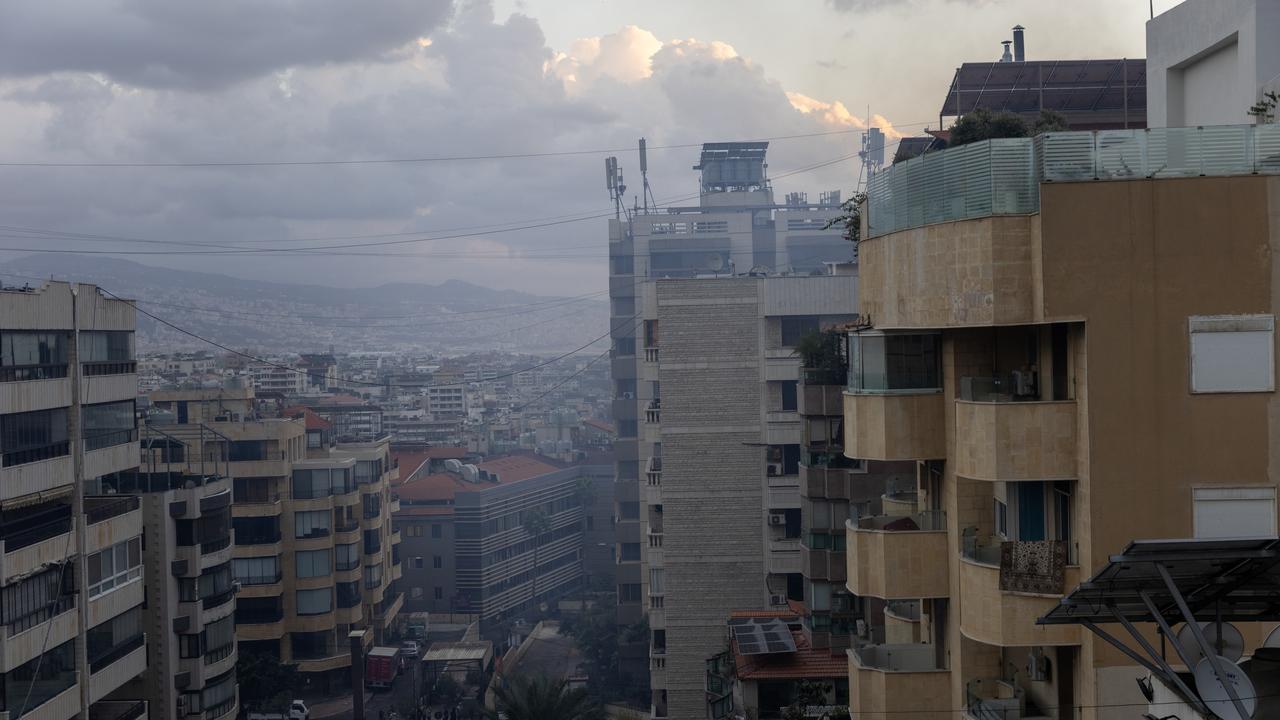Pyongyang throws down nuclear gauntlet
North Korea detonates its most powerful weapon yet and boasts it can fit the hydrogen bomb on an intercontinental ballistic missile.

North Korea has declared itself to be a thermonuclear power with the detonation of its most powerful weapon yet — and boasted that it can fit the hydrogen bomb on an intercontinental ballistic missile.
In a stunning challenge to US President Donald Trump and the region, dictator Kim Jong-un’s regime yesterday claimed it had tested a hydrogen bomb with “perfect success”.
The test was of a bomb with “unprecedentedly large power”, a jubilant newsreader announced on state television, and “marked a very significant occasion in attaining the final goal of completing the state nuclear force”. The announcement came after neighbouring countries detected a magnitude-6.3 earthquake in northeastern North Korea.
The tremor was believed to have been man-made, triggering fears Pyongyang had detonated its sixth nuclear test and its second in two years. The blast was estimated at eight times more powerful than the bomb that destroyed Hiroshima in 1945.
The Japanese government later confirmed the explosion was a nuclear device.
The latest actions followed swiftly on North Korea’s shock launch last Tuesday of a ballistic missile over Japan’s northern island of Hokkaido, triggering alarms that sent thousands of Japanese into shelters at dawn.
Malcolm Turnbull, Foreign Minister Julie Bishop and Defence Minister Maris Payne said in a joint statement Australia “utterly condemns North Korea’s flagrant defiance of UN Security Council resolutions”.
The statement called for the permanent five Security Council members to apply the “maximum possible pressure to this dangerous pariah regime”.
“North Korea is the only country that is testing nuclear weapons, and responsibility for the increasing tensions in the region sits with Pyongyang,’’ the statement said. “North Korea’s reckless conduct poses a grave danger to global peace and security.”
Mr Trump was due to meet his national security team late last night, and to prepare new sanctions against North Korea.
He earlier tweeted that: “North Korea is a rogue nation which has become a great threat and embarrassment to China, which is trying to help but with little success. South Korea is finding that their talk of appeasement with North Korea will not work, they only understand one thing.”
..North Korea is a rogue nation which has become a great threat and embarrassment to China, which is trying to help but with little success.
— Donald J. Trump (@realDonaldTrump) September 3, 2017
US national security adviser HR McMaster was reported to have held a 20-minute emergency phone call with South Korean counterpart Chung Eui Yong.
South Korean President Moon Jae-in called an emergency meeting of his national security council and placed the military on full alert. Major General Cho Han-kyu, the head of the Joint Chiefs of Staff’s operation office, said South Korea was preparing a strong response.
South Korea and the US had “adequate capability” to retaliate, he warned, adding the combined forces of the allies would “show their powerful response through action”.
China slammed Pyongyang for ignoring international condemnation of its nuclear program.
North Korea “has ignored the international community’s widespread opposition”, again carrying out a nuclear test.
“China’s government expresses resolute opposition and strong condemnation towards this,” the Foreign Ministry said.
“We strongly urge the DPRK (North Korea) to face the strong will of denuclearisation from the international community, earnestly abide by the relevant resolutions of the UN Security Council, stop taking mistaken actions which worsen the situation and are also not in line with its own interests, and effectively return to the track of solving the problem through dialogue.”
Russia urged calm as it denounced North Korea. “This latest demonstrative disregard by Pyongyang of the requirements of the relevant resolutions of the UN Security Council and the norms of international law deserves the strongest condemnation,” the Foreign Ministry in Moscow said.
“In the unfolding conditions, it is imperative to remain calm and refrain from any actions that lead to a further escalation of tension.”
Hours before the tremor, photographs showed Kim inspecting what was claimed to be a hydrogen bomb ready to be loaded on to an ICBM. No verification was immediately available that this was, as the Korean Central News Agency claimed, a “thermonuclear weapon with super explosive power made by our own efforts and technology”.
Chinese monitors said they detected a second quake shortly afterwards of magnitude 4.6, which could have been due to a “collapse (cave in)”, suggesting the rock over the underground blast had given way.
KCNA said the country had “recently succeeded” in building a hydrogen bomb to load on an ICBM. It said the bomb was built from “homemade” materials and the state could make “powerful nuclear weapons as many as it wants”. The country has conducted five nuclear tests, the last in September last year.
Yesterday’s test had an explosive yield of 120 kilotons of TNT, compared with the 15 kiloton blast over Hiroshima. A hydrogen bomb has never been used in combat, but is considerably more deadly than atomic bombs.
Mr Trump spoke earlier in the day with Japanese Prime Minister Shinzo Abe about the “escalating” crisis posed by Pyongyang.
Pyongyang’s decision to conduct the latest nuclear test came less than two months after North Korea conducted its first successful long-range missile test.
Japanese Foreign Minister Taro Kono said after the test: “It is absolutely unacceptable if North Korea did force another nuclear test, and we must protest strongly.”
International Atomic Energy Agency head Yukiya Amano described the North test as “an extremely regrettable act” in “complete disregard of the repeated demands of the international community”.
The escalating tensions over the past month were initially sparked by the decision of the UN Security Council to approve sweeping new sanctions against North Korea in response to its missile tests.
North Korea reacted to the sanctions by threatening the US, which led Mr Trump to say he would rain “fire and fury” upon North Korea. Pyongyang responded by threatening to fire a missile in the waters near Guam.
Analysts believe Pyongyang has been developing weapons capability to give it a stronger hand in any negotiations with the US.
“North Korea will continue with their nuclear weapons program unless the US proposes talks,” Koo Kab-woo of Seoul’s University of North Korean Studies said.
He pointed to the fact that Pakistan — whose nuclear program is believed to have links with the North’s — conducted six nuclear tests in total, and may not have seen a need for any further blasts.
“If we look at it from Pakistan’s example, the North might be in the final stages” of becoming a nuclear state, he said.
Additional reporting: Agencies
Cameron Stewart is also US contributor for Sky News Australia


